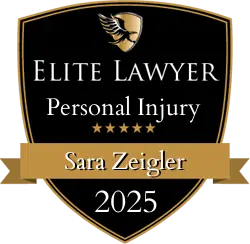Riding a motorcycle gives bikers a certain sense of freedom. Having the power of a vehicle at your fingertips and the wind in your face is exhilarating. Unfortunately, while riding a bike has many benefits, there are also some drawbacks. Even though there are over 50,000 registered motorcycles in West Virginia, and therefore many bikes on the road, many motorists still overlook them, which often results in serious accidents. This is particularly true on congested roads and areas of high traffic.
Bikers may feel that they need to ride between lanes of traffic, which is referred to as lane splitting. This leads to the question: Is lane splitting legal in West Virginia? Below, our West Virginia motorcycle accident lawyer explains further.
What is Lane Splitting?
In the United States, there is a bit of controversy surrounding motorcycle lane splitting. Lane splitting occurs when a motorcyclist rides their bike between lanes of traffic, usually when traffic is congested or slow-moving. Riders, in these instances, still travel in the same direction of traffic but ride between lanes.
One of the reasons for the controversy is that there is a much smaller number of bikers in the United States than in other parts of the world.
In Asia and Europe, for example, there are often more motorcycles than other types of vehicles, and so, the laws regarding them are not as strict. In these areas, lane splitting has been legal for decades.
Lane filtering also falls under the term ‘lane splitting’ in West Virginia. This occurs when a motorcycle rides between stopped vehicles, most often at intersections, to proceed to the front of the line. Lane sharing, on the other hand, differs from lane splitting. Lane sharing occurs when two bikers ride in the same lane side-by-side. This practice is discouraged because it reduces the distance between each biker in the event of a dangerous situation.
Is Lane Splitting Legal in WV?
No. Lane splitting is not legal in West Virginia. Although the West Virginia Code does not specifically refer to motorcycle lane splitting, it does state that all vehicles should be driven as reasonably as practical within a single lane of traffic. Like drivers, motorcyclists who do not remain safely within a single lane may face fines and even misdemeanor charges if they are convicted of violating traffic law.
Why is Lane Splitting So Dangerous?
The West Virginia Department of Motor Vehicles (WVDMV) has published a Motorcycle Operator Manual that outlines the specific dangers of lane splitting and lane filtering. Some of these are as follows:
- The door of another vehicle could open
- A person may put their hand out of the window of another vehicle
- Another vehicle could suddenly change lanes or turn
While other motorists have a responsibility to watch for motorcyclists, bikers are often overlooked.
Drivers often do not see bikers until it is too late, and they crash into them. Additionally, many motorists hold biases against bikers. When they see them lane splitting, it can cause other motorists to drive recklessly while trying to prevent bikers from lane splitting and trying to hurt a motorcyclist intentionally.
Why Do Motorcyclists Split Lanes?
There are a number of reasons motorcyclists are tempted to split lanes. Many advocacy groups have also promoted the benefits of lane splitting. When bikers split lanes, they can move more quickly through stopped or heavy traffic, get off highways more quickly and easily, and avoid rear-end accidents. Still, even in California, where lane splitting is legal, it is advised to only engage in the practice when surrounding traffic is traveling at less than 15 miles per hour.
Regardless of the potential benefits of motorcycle lane splitting, it is strictly prohibited in West Virginia. Lane splitting in the state is not only very dangerous for bikers, but it can also impact liability after a crash.
Who is Liable for a Lane Splitting Accident?
As a tort state, accident victims can claim compensation for their medical expenses, lost income, and other losses after a negligent party causes an accident that results in injury. However, if you are a biker and practice lane splitting, it can have a significant impact on the amount of compensation you receive.
Under West Virginia’s comparative fault law, bikers can only claim compensation if they are found to be 50 percent or less at fault for a crash. Other motorists may argue that bikers do not deserve any compensation if they were lane splitting at the time of the crash. They may argue that you entirely caused the accident, or that lane splitting significantly contributed to the accident.
Even if you are not found more than 50 percent at fault, lane splitting can still greatly reduce the amount of damages you receive. Under the comparative fault law, any compensation that accident victims receive will be reduced by their same percentage of their fault when their share of blame is 50 percent or less. For example, the insurance company or court may determine that lane splitting contributed 20 percent to the crash. If you were originally awarded $100,000 in damages for a crash, you would only receive $80,000 because of your percentage of fault.
Not receiving the full amount of damages you need to cover your losses could result in you paying some expenses out of your pocket. To ensure you are complying with the law and that you are not found even partially liable for a crash, it is important to never split lanes.
Our Motorcycle Accident Lawyer in West Virginia Can Help
Regardless of whether you were lane splitting at the time of a crash or not, you need legal advice. At Kaufman & McPherson, PLLC, our West Virginia motorcycle accident lawyers can refute any defenses raised by the other side, ensure your rights are upheld, and guide you through the process so you obtain the full and fair settlement you are entitled to. Call us today at 304-842-4300 or fill out our online form to schedule a free review of your case and to get the legal help you need.









